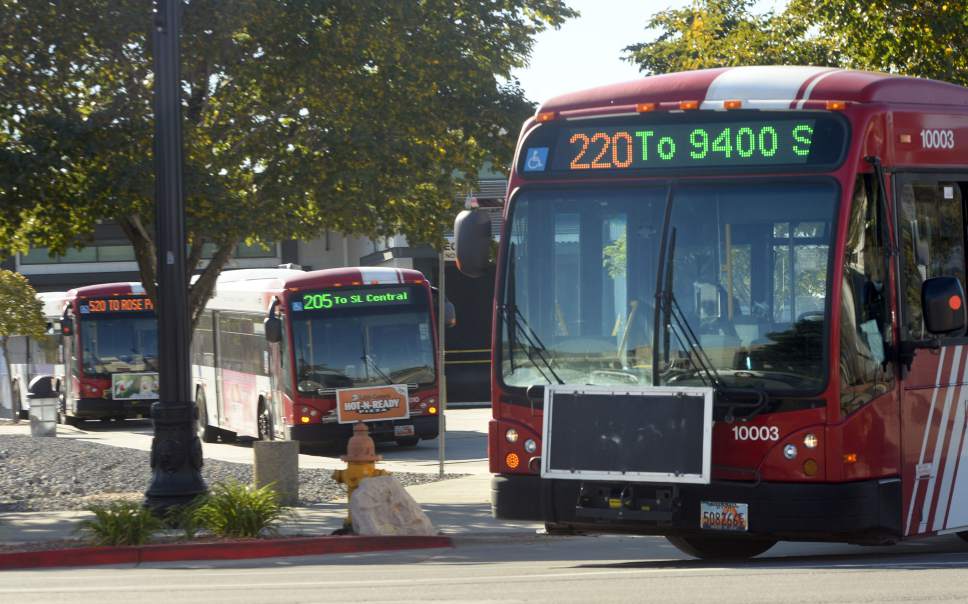This is an archived article that was published on sltrib.com in 2016, and information in the article may be outdated. It is provided only for personal research purposes and may not be reprinted.
The Utah Supreme Court suggested Friday that it might not be the right court to decide whether voters should have a chance to halt a $190 million bus rapid transit (BRT) project in Provo and Orem, which is under construction.
Several justices suggested in oral arguments that the two cases under consideration should be sent to the district court because plenty of time exists before the November 2017 city elections, when the matter could be put on the ballot. It said direct petitions to the state's high court usually come when timing is more critical.
Justice Deno Himonas also said the district court would be more likely to issue an injunction to temporarily halt the Utah Transit Authority project, and avoid deciding the cases only on procedural issues.
Attorneys on both sides told the court they were surprised by its questions over jurisdiction, and both urged the court to keep the case and decide the issue quickly.
Himonas asked attorneys for Provo and Orem if they opposed sending down the cases because it would, in his view, increase the chances of an injunction to halt the project while it is reviewed.
Attorney Robert Hughes, representing Provo, said the threat that a voter referendum could kill the BRT line "puts a cloud on the project," and that is why it wants a quick resolution.
"And there would be a bigger cloud if a district judge places an injunction" to halt construction, Himonas said.
Himonas also said if the Supreme Court keeps the case, a good chance exists that it could rule against the referendums on procedural grounds — rather than on the merits of the case.
"That probably would not break your heart," Himonas joked with Troy Booher, attorney for Orem. Booher responded: "No, it would not break my heart."
Frank Mylar, attorney for citizen groups seeking a vote on the project, also asked the court to keep the case.
He said a quick resolution is needed, in part because UTA is moving forward with the BRT line. A ruling to allow an election could stop work before it proceeds to the point where voters may figure rejecting the project would waste too much money.
In July, the UTA board approved launching the controversial line immediately, moving forward without $23.8 million in advance funding that it says federal and county governments will almost surely reimburse later. Citizen groups contend that move was meant to stop a possible referendum, but UTA said a quicker start would save millions of dollars in construction cost.
UTA this week unveiled its proposed budget for next year, which includes $120 million for the project — showing construction could be well advanced or nearly finished before any vote in November 2017. The BRT would use extra-long buses. It would have bus-only lanes for about half of its 10.5 mile route. Buses may receive priority at traffic signals and would arrive about every six minutes at peak times.
The route would include Utah Valley University, Brigham Young University, downtown Provo and the Provo Towne Centre mall.
At issue are no-cost leases approved by city councils in Provo and Orem to allow UTA to use some city streets for the dedicated bus lanes or other facilities such as bus stops. Citizen groups said approval of those leases was a legislative action, and they gathered enough signatures to put the issue on the November 2017 ballot.
The cities, however, rejected their petitions contending that approving the leases was an administrative action not subject to referendum.
Mylar said because the councils voted on the leases, that shows their approval was a legislative action.
The Supreme Court took the matter under advisement and will issue a decision later.
UTA leaders have said the BRT would not be stopped by the referendums because the project is mostly on state highways. It said the referendums could exclude some enhancements negotiated for city streets. But referendum groups said the change would eliminate some key local matching efforts needed to secure federal funding, which could torpedo the entire project.



